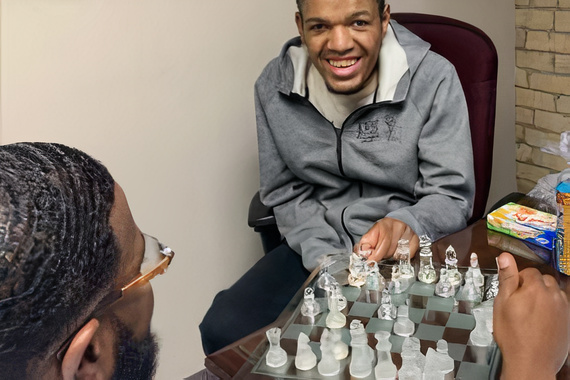“Into Adulthood” improves disability access for young adults

Will O’Leary was born with developmental disabilities. He suffered abuse, neglect, and traumatic brain injury as a toddler and had little stability through his early years. At the age of 16, behavioral problems and a lack of advocacy landed O’Leary at St. Peter Regional Treatment Center on a unit with adults who were mentally ill and aggressive. The 40 minutes of “educational services” he received there each day were spent filling out a worksheet.
A judge recognized the inappropriate placement and ordered O’Leary’s release to a group home. The order specified educational services as a top priority. The State Ombudsman involved in the case invited Minnesota Disability Law Center (MDLC) Legal Advocate Cindy Jarvi to help determine what those educational services should be. Since then, Jarvi has been fighting for O’Leary’s right to an appropriate education.
Thanks to the five-year cooperative efforts of Jarvi and community partner KWST Behavioral Development Group, O’Leary, now 21, is transitioning into adulthood with new skills and a developing sense of self-worth.
Playing Educational Catch-Up
Keary Saffold, M.Ed., President of KWST Behavioral Development Group, is an educator familiar with the struggles particular to young Black men. At Jarvi’s suggestion, the Anoka-Hennepin School District approved school funds to hire Saffold as a teacher and life skills coach. Saffold brought the expertise and cultural understanding that were necessary to connect with O’Leary and help him to learn and succeed.
“For years, Will had virtually zero educational services,” Jarvi says. “The things that should’ve happened didn’t happen, and the blame and consequences fell on him.”
“Will’s history is heart-wrenching,” Saffold says. “You talk about predictable outcomes, just look at his situation. It was clear to me that we needed to build up his intrinsic motivation. People working with Will had been giving him tokens for everything. I agree with positive reinforcement and use it myself, but that’s not the approach I wanted to use. Will is a human being, not a seal. I wanted to tap into his humanity.”
A New Direction
Saffold started with the development of basic social skills. O’Leary learned to greet and introduce people, to negotiate with others, and to control his own emotions and behaviors. The next step was more community interaction and some basic job skills. Saffold reached out to his old friend Robert Nabors, owner of Nabors Cut LLC.
“Will found his niche here in my salon,” says Nabors. “He greeted clients, offered them water, and swept up after the cut. He did laundry, washed the windows, and, most important, he represented the business.”
Saffold worked with Nabors to develop role-playing exercises that O’Leary could apply to his work at the salon. Each week, he and Nabors collaborated to create real-life opportunities for O’Leary to use those specific skills. O’Leary was well-loved at Nabors Cut, and other salons started to request his services.
“It was tremendous to witness Will’s human capital rise at that job,” says Saffold. “The experience gave him the benefits of just being a guy at the barber shop shooting the breeze with the fellows.”
“My job inspires me,” O’Leary said. “Some of the work is hard but it doesn’t make me mad. It makes me happy. I like being here and leaving it clean so when I’m not here, people say, ‘Where’s Will?’ They see the work I’m doing and they like that I’m here, and they want me to come back more.”
COVID-19 came as a blow for Nabors Cut and for O’Leary. When O’Leary turned 21 in July, Jarvi reminded the school district of their obligation to provide compensatory educational funds. Those funds allowed Saffold to work with O’Leary through the summer of 2020 as he dealt with the pandemic and the loss of his job.
“The pandemic multiplied already significant barriers and challenges for Will,” Jarvi says. “The best thing that could happen was for Keary to continue in the role of teacher and life skills coach.”
Building Resilience
Jarvi will continue to advocate for O’Leary as he transitions to adult services through the State Vocational Rehabilitation Program. Jarvi and Saffold have given O’Leary a solid foundation, and they hope to help him continue on that road.
“The system cheated this kid at every turn,” Jarvi says. “Additional transitional services are critical for his success and well-being. The system owes him, and I’m committed to ensuring he gets everything he is entitled to by law.”

